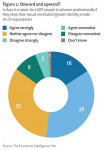Talent roadblocks greatest barrier to growth in developed and emerging markets, says fifth annual CEO Briefing survey
In developed markets, the high cost of labour is the primary barrier to growth, according to the 1,006 executives surveyed. As competition for talent heightens in all markets, firms will put more effort into their own training and development programmes, while also emphasising performance-based compensation more than ever.
The survey highlights the importance of emerging markets to companies as primary revenue and sourcing opportunities. A clear majority of respondents intends to invest more time and money in emerging markets over the next three years than in developed markets. For the second year running, rising demand in the developing world is seen as the most critical force at play in the global marketplace (34%), followed by global sourcing (32%).
"Although the differences between the developed and developing worlds are eroding, the report makes it clear that they are still very distinct business landscapes," says Andrew Palmer, editor of the report.
As well as battling with a shortage of skilled local workers, business leaders entering emerging markets face trade and investment barriers, feel that they have a poorer understanding of customers and are more worried by the risk of economic and financial volatility. For developed markets, by contrast, executives from all over the world point not just to high labour costs but also saturated markets as the critical challenges they face. Strategies differ too: firms will primarily focus on pushing new products at existing customers in developed markets, while offering existing products to new customers in emerging markets.
Commenting on the report, Andrew Cahn, Chief Executive of UK Trade & Investment said: “This report gives a crucial insight into the way executives around the world view the challenges and opportunities facing global business. Emerging markets are clearly top of the agenda, but they’re not risk-free environments, and the business culture is frequently very different. It is more important than ever that corporate leaders have access to high quality, impartial advice on which to base their management decisions.”
Other key findings from the report include:
· Business leaders are more bullish than ever ... Respondents to the fifth annual CEO Briefing survey are more buoyant than they have ever been. Nine out of every ten executives polled for this report consider business prospects over the next three years to be either ‘good’ or ‘very good’. Strikingly, nearly a third of executives (28%) chose the latter option, up from 20% in 2006 and just 9% in 2005. There are certainly good reasons to be cheery. The global economy expanded by some 5.4% in 2006 (measured at purchasing power parity exchange rates) and is expected to continue to grow robustly (4.7% on average) over the next five years.
· … but the risks are also substantial. Thanks to ongoing headlines about Iraq, Iran and the Middle East, along with tensions in North Korea, geopolitical instability continues to worry executives. Economic risks are clearly visible too. Interest rates have been on the rise for the past two years in the US and Europe. A sharp slowdown in the US housing market is leading to fears of a decline in consumer spending, while the ongoing decline in the dollar has put pressure on exporters to the US market.
· Trade and investment barriers remain a considerable problem, particularly in emerging markets. Nonetheless, 85% of respondents are planning to expand in overseas markets in 2007, primarily in order to increase sales revenue. Sourcing ideas and innovation is a key driver of expansion into developed markets, while reducing costs remains a major attraction of emerging markets.
· India more upbeat than China. China and India are the headline-grabbers of globalisation. Respondents based in both countries are fired up about prospects for business in 2007 but China-based executives are notably cooler. Eight out of ten respondents there say the outlook is promising, but just 3% agree that it is looking "very good", well down on a figure of 28% overall. India-based executives, by contrast, are practically melting with excitement: 98% say the prospects are either good or very good, with 70% of those falling into the "very good" camp.
· Asia-Pacific is the world’s workshop, but also its biggest source of new demand·and risk. 52% of executives selected Asia-Pacific as the region offering greatest opportunities for revenue growth over the next three years, far ahead of North America (13%) and Western Europe (10%). Similarly, 59% of survey respondents saw Asia as their key sourcing destination, with Central and Eastern Europe in a distant second place (15%). But the region is also seen as the riskiest for business: 29% of respondents rated it as the region with the highest operational risk, followed by the Middle East and North Africa (25%).
· China will vie with the US and the UK as the top executive travel destination. China came a narrow second to the US as a primary travel destination for business leaders in 2007, but easily tops the list if Hong Kong is included. The UK is in third position, while India will be a more common destination for respondents than Germany, France and Japan, bigger economies all.
Notes for editors:
CEO Briefing, corporate priorities for 2007 and beyond, is an annual survey from the Economist Intelligence Unit, sponsored by UK Trade & Investment. A total of 1,006 executives from 84 countries around the world participated in the survey, representing all major industries. Half of all respondents were C-level executives. 27% of respondents were from Asia-Pacific, 25% from North and Latin America and 40% from Western, Central and Eastern Europe. Half of all firms had revenue of US$500m or less, a quarter had revenue between US$500m and US$5bn and a quarter had revenues of US$5bn or more. To supplement the survey results, the Economist Intelligence Unit also conducted in-depth interviews with more than 30 CEOs, CFOs, chairmen and other senior executives from major companies in all of the world's regions.
The Economist Intelligence Unit bears sole responsibility for the content of this report. The Economist Intelligence Unit's editorial team executed the online survey, conducted the interviews and wrote the report. The findings and views expressed in this report do not necessarily reflect the views of the sponsor.
About the Economist Intelligence Unit
The Economist Intelligence Unit is the business information arm of The Economist Group, publisher of The Economist. Through our global network of 700 analysts, we continuously assess and forecast political, economic and business conditions in nearly 200 countries. As the world's leading provider of country intelligence, we help executives make better business decisions by providing timely, reliable and impartial analysis on worldwide market trends and business strategies.
About UK Trade & Investment
UK Trade & Investment is the UK Government's international business development organisation, supporting businesses seeking to establish in the UK and helping UK companies grow internationally. The services offered by UK Trade & Investment bring together a network of business sector specialists and support teams in British embassies and Foreign and Commonwealth Office (FCO) posts all around the world, as well as key experts in government departments across the UK. UK Trade & Investment works with a wide range of partner organisations in the UK, including Regional Development Agencies and the Devolved Administrations, Business Links, Chambers of Commerce and trade associations. For more information, visit the web site at www.uktradeinvest.gov.uk. For latest press releases, visit the online newsroom at http://www.newsroom.uktradeinvest.gov.uk
웹사이트: http://www.eiu.com
연락처
Edgar Fernandez
Marketing Manager, Asia-Pacific
(852) 2585 3826 이메일 보내기
Fax: (852) 2802 7007
이 보도자료는 Economist Intelligence Unit가(이) 작성해 뉴스와이어 서비스를 통해 배포한 뉴스입니다. 뉴스와이어는 편집 가이드라인을 준수합니다.




